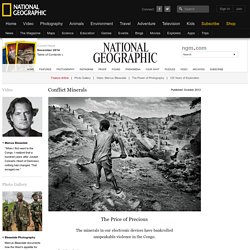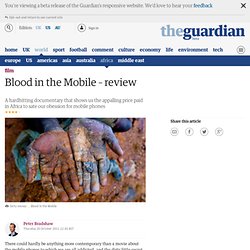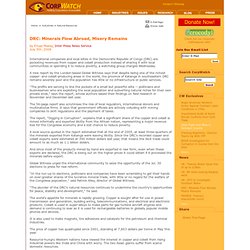

The Price of Precious. The first child soldier pops out of the bush clutching an AK-47 assault rifle in one hand and a handful of fresh marijuana buds in the other.

The kid, probably 14 or 15, has this big, goofy, mischievous grin on his face, like he’s just stolen something—which he probably has—and he’s wearing a ladies’ wig with fake braids dangling down to his shoulders. Within seconds his posse materializes from the thick, green leaves all around us, about ten other heavily armed youngsters dressed in ratty camouflage and filthy T-shirts, dropping down from the sides of the jungle and blocking the red dirt road in front of us.
Our little Toyota truck is suddenly swarmed and immobilized by a four-and-a-half-foot-tall army. This is on the road to Bavi, a rebel-controlled gold mine on the Democratic Republic of the Congo’s wild eastern edge. The mine in the Bavi area is a perfect example. “Sigara! When we get to Bavi, we sit down with the village elders and talk gold. He burps—loudly. “For what?” Blood in the Mobile – review. There could hardly be anything more contemporary than a movie about the mobile phones to which we are all addicted, and the dirty little secret of their manufacture.

They all require the mineral coltan for electronic components, much of which is mined in a lawless eastern part of the Democratic Republic of the Congo, whose gangsters, warlords and rogue army units "tax" every aspect of this grisly industry. Coltan mining and mobile-phone use has effectively financed murder, intimidation and mass rape as a way of life. Danish director Frank Poulsen has made a tough investigative film about this, demanding that his own supplier, Nokia, owns up to how much coltan it is buying from the DRC, and travels out there to see conditions for himself. The mine turns out to be a chaotic shanty-town on a mountain honeycombed with unsafe tunnels, and policed by warring factions of scary, trigger-happy bullies. The mining and gangsterism have grown up together, dysfunctionally hand in hand. DRC: Minerals Flow Abroad, Misery Remains. International companies and local elites in the Democratic Republic of Congo (DRC) are pocketing revenues from copper and cobalt production instead of sharing it with local communities or spending it to reduce poverty, a watchdog group charged Wednesday.

A new report by the London-based Global Witness says that despite being one of the richest copper- and cobalt-producing areas in the world, the province of Katanga in southeastern DRC remains severely poor and the population has little or no infrastructure or public services. "The profits are serving to line the pockets of a small but powerful elite -- politicians and businessmen who are exploiting the local population and subverting natural riches for their own private ends," says the report, whose authors based their findings on field research in November and December last year. The 56-page report also scrutinises the role of local regulators, international donors and multinational firms. "We know that the Congo is rich. Mining firms face scrutiny over Congo deals.
MPs are set to launch an investigation into the involvement of British-connected shell companies and London-listed mining groups in opaque deals to acquire prime mining assets in the Democratic Republic of the Congo, one of the poorest countries on Earth. News of the potential inquiry, which could involve top FTSE 100 mining executives being called to give evidence, comes as campaigners argue that natural resources deals are benefiting multinationals rather than the DRC's population. Commodity trader Glencore will also face calls to explain its involvement in the resource-rich central African country. Pauline Latham, a Conservative MP and a member of the 11-strong international development select committee, said: "If the money [from the mining deals] stayed in the country and was used for the benefit of the people, they wouldn't need aid money and they'd all be much better off.
A spokesman for Gertler rejected the claim his companies had bought the mines on the cheap.